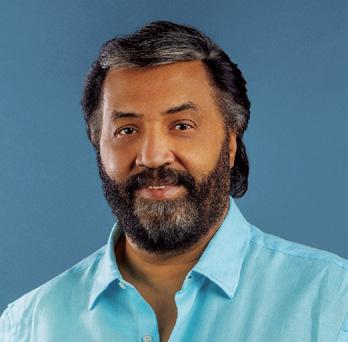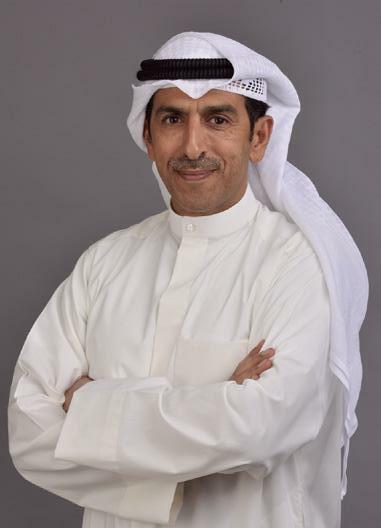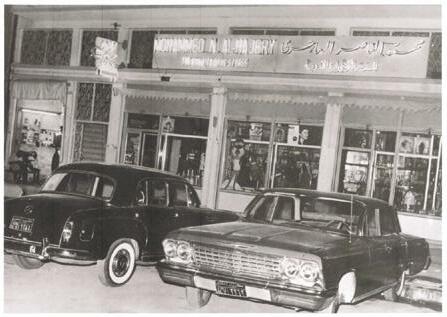
10 minute read
I World’s 5 Richest Investment Billionaires
Billionaires
World’s 5 Richest Investment Billionaires
Here are the richest five people in the world who built their fortunes from investing, according to Forbes. All five reside in the U.S. and are self-made billionaires. Net worths are as of November 11, 2022.
1. Warren Buffett
Net worth: $106.3 billion Country: U.S. Seasoned investor Buffett runs Berkshire Hathaway, which owns dozens of companies, including insurer Geico, battery maker Duracell and restaurant chain Dairy Queen. He first bought stock at age 11 and first filed taxes at age 13. As of November 2022, Berkshire’s $296 billion investment portfolio comprised 49 companies. The 92-year-old has promised to give away over 99% of his wealth. So far, he has donated more than $49 billion, mostly to the Gates Foundation and his kids’ foundations. Buffett established the Giving Pledge with Bill Gates in 2010, asking billionaires to donate at least half of their wealth to charitable causes.
2. Ken Griffin
Net worth: $31.9 billion Country: U.S. Griffin is the founder and CEO of Citadel, a Miamibased hedge fund firm that manages roughly $59 billion in investment capital, as of November. He launched Citadel in 1990 but first began trading from his Harvard dorm in 1987, where he put a satellite dish on the roof to get real-time stock quotes. Griffin is also non-executive chairman of Citadel Securities, one of Wall Street’s biggest market-making firms. The 54-year-old has given $1.5 billion to philanthropic causes.
Ken Griffin
3. Stephen Schwarzman
Net worth: $31.7 billion Country: U.S. Private equity firm Blackstone’s chairman and CEO Schwarzman founded the company with the late Peter Peterson in 1985. Initially a boutique mergerand-acquisition advisory business, Blackstone grew into the world’s largest alternative asset manager, with $951 billion in assets under management, as of September. The 75-yearold’s first entrepreneurial attempt was a lawn-mowing operation at age 14, employing his younger twin brothers to mow while he brought in clients. 4. Jeff Yass
Net worth: $30 billion Country: U.S.
Yass cofounded Susquehanna International Group, one of Wall Street’s largest and most successful trading firms. Yass started trading on the Philadelphia Stock Exchange in 1981, backed by billionaire Israel Englander. The 64-year-old established Susquehanna with a handful of partners in 1987, with no outside money, naming the firm after the Susquehanna River. The firm made millions in the Black Monday crash of October 1987. It has since invested in hundreds of private companies, including its most valuable holding in TikTok parent ByteDance.
5. Jim Simons
Net worth: $28.1 billion Country: U.S. Simons founded Renaissance Technologies, a $50 billion quantitative trading hedge fund firm. Established in 1982, Renaissance is famous for its Medallion Fund, a $10 billion black-box strategy that is only open to Renaissance’s owners and employees. Simons retired in 2010 but still plays an active role in the company and benefits from its funds. The 84-yearold has given $4 billion to philanthropic causes, including Math For America and autism research.
Scan this QR code to open the website
The Art of Managing Disruption
Nour Suliman, CEO of DHL Express MENA, shares the company’s winning formula for operational resilience.
The past few years have seen their fair share of disruption, from a global pandemic which put businesses, economies, and individuals under extreme strain to climate concerns, wars, and energy shortages. As a company that relies heavily on delivering shipments in the shortest time possible, any glimpse of a scenario which can potentially result in broken links, delays, border closure, and more, is considered a risk to service continuity.
While the logistics industry is prone to emergency situations, and global players have robust risk management mechanisms to fall back on, it is worth remembering that no two crises are ever the same. With this in mind, a critical step once the initial shock of an event subsides, is to take note of the lessons learned and set clear priorities for the post-recovery phase. Here, DHL has consistently prioritized three winning verticals as the winning formula for business rebound and operational resilience during crises, centering on employees, customers, and technology.
Adopting an employee-first approach has remained top on DHL’s agenda, especially as the industry continues to witness a transformation in the labor makeup, labor shortages, and talent-retention challenges. The company has always gone above and beyond, investing substantially in new-age HR practices to foster a culture of unity and trust, where people feel safe, protected, and willing to give it their all, even during the most challenging circumstances.
Customer-centricity is also deemed important, more so now than ever before. Emerging trends in retail and technology, concerns over the environment, and shifting buying habits, have all compromised customer loyalty. The traditional depiction of brand loyalty has taken an evident turn, reversing the roles and putting more pressure on brands to demonstrate commitment, versus customers. DHL has willingly placed customers at the forefront of its value system and pledged to continue to excel in this regard by training and inspiring its employees to set customer success as their ultimate goal.
Next on the list of DHL’s priorities
is technology. Technology innovation and digitalization is something DHL has been heavily focused on, with substantial investments made to improve both DHL’s offering to its customers and the work of its employees. As e-commerce continues on its upward trend, expectations for last-mile delivery innovation remain high, calling for the integration of new technologies to enhance the service offering and guarantee a seamless delivery experience. The enhancement of predictive capabilities through data and analytics has also proven successful in minimizing operational risk through better planning, visibility, and efficiency of complex operations. In addition, DHL has embraced automation technologies to improve health and safety in the workplace, by facilitating manual activity and reducing risk of injury.
While the world may never be free of disruption, organizations can better safeguard their future by building a resilient and agile business model based on lessons learned and winning formulas that tap into business strengths, to secure operational effectiveness against any future crises.

Nour Suliman, CEO, DHL Express MENA www.dhl.com

Growing A Solid Portfolio For Long-Term Sustainability
As Kuwait’s Mohamed Naser AlHajery and Sons Company (MNH) celebrates its 75th anniversary, CEO Musaed Ibrahim AlHajery discusses the family conglomerate’s growth, challenges, and vision for the future.

How has MNH withstood the changes and challenges of the past 75 years? MNH started with a single drugstore in the heart of Kuwait City, meeting the essential needs of a society that was seeing a tremendous change in its economy and infrastructure thanks to the discovery of oil a few years earlier. The growth of the company came naturally. We expanded by becoming distributors of products needed in the local market, whether relating to health or primary needs. And here is where our success of the decades lies.
As a family business, our growth warranted being innovative and at the forefront of developments across sectors, as well as adapting to changes in consumer behavior. This started shifting significantly in the 1970s, and economic challenges rose globally. This was when MNH accelerated its diversification plans by expanding its partnerships with world-class brands as well as venturing into innovative homegrown brands beyond pharmaceuticals and consumer healthcare, moving as well into medical equipment, FMCG, food and beverage, and perfumes and cosmetics.
This is how MNH maintained its market position year-on-year, serving its local market far beyond just the mere distribution of products, offering products and services that mirror the company’s business integrity and values.
How has the company’s strategy changed over the years? Our strategy has changed since the beginning, but one element has remained integral, and that is the importance we place on providing products we truly believe in and that are beneficial to our customers. In the 1940s, the market was untapped, and there was vast room to grow a strong portfolio of products. As the local market grew, our strategy became more defined and focused on providing products and services that we qualify as “human care.”
Our focus on the quality and benefits of what we offer are the foundation to the success of our business.
How has the pandemic affected business? Is the company ready for possible challenges in the future? Without a doubt, the pandemic had a negative impact on parts of the business. But what it affected on one side of our portfolio was compensated by the products that we carry on the other. Pharmaceuticals and food and beverage are two of the safest, if not the safest, sectors in times of crisis. Individuals will always need food and medication. While
Scan this QR code to open the website
other sectors were affected by restrictions and lockdowns, pharmaceuticals and food and beverage increased in market share and recorded higher revenues, compensating for the loss in our other sectors.
The growth we saw in 2020 was sustained in 2021 thanks to a bold plan to continue marketing our products, investing more in digital infrastructure, and encouraging our human capital to maintain our newfound market positions.
The pandemic was a testament to the flexibility and strength of our strategy, first and foremost. It was also a catalyst for fresh opportunities and a drive to maintain new market share.
Can you tell us more about the company’s performance across the sectors it serves? Our products have a very high penetration in pharmaceuticals, healthcare, and food and beverage. Food specifically can be found in wholesalers, groceries, and retail stores, as well as online on B2B and B2C platforms. This penetration is supported by strong investment in marketing, which we believe is one of our strengths.
What are the company’s other key strengths? Our diversity gives MNH stability. Diversity in our portfolio and diversity in our capabilities, including our people. Our people are our pride. We all truly believe in what we are selling, and this is how we are able to expand our footprint. In which industry sectors do you expect to see MNH grow and invest further in the future? Without a doubt, in the digital world. We started to invest heavily in online platforms years before the pandemic, and that investment yielded fruit in the past three years. We have a major ownership in two ecommerce companies, which enables us to gain from integrated platforms that also sell our products in addition to everything else needed by consumers.
What are your business priorities for the next year? To ensure we continue providing to our local consumers despite international and external challenges that have a direct impact on our local economy. MNH has weathered economic and geopolitical challenges in the past thanks to its diversified business, and we believe that the challenges we see ahead of us, such as inflation, will be overcome as well.
How has the family involved in the business contributed to its success? We have a motto as a family: the success of a family business can only be sustained with the contribution of family members. We are not just investors. On the contrary, we are hands-on, and you will find members in every rank contributing to the business. Knowledge transfer is an essential element in our strategy, and we have invested in structuring the family succession to ensure the next phase of growth.
Do you have any plans to go public? It is true that family businesses have been turning to listing in recent years to capitalize on their growth. The appetite for investing in them has also been significant as they are seen as conductors in the diversification of local Gulf markets that have been historically dependent on oil and gas.
MNH enjoys very healthy growth today. Our cash flows have been at their best levels in recent years. Our partnerships are growing, and our operations are acquiring new segments. As both an investor in and operator of brands, we do not see the need to expand to finance growth that we are more than capable of driving ourselves. We already have the capabilities both financially and operationally. What opportunities a listing could bring to our business in the future will be looked at when the time is right.








